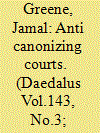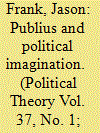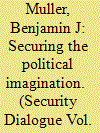| Srl | Item |
| 1 |
ID:
132774


|
|
|
|
|
| Publication |
2014.
|
| Summary/Abstract |
Within U.S. constitutional culture, courts stand curiously apart from the society in which they sit. Among the many purposes this process of alienation serves is to "neutralize" the cognitive dissonance produced by Americans' current self-conception and the role our forebears' social and political culture played in producing historic injustice. The legal culture establishes such dissonance in part by structuring American constitutional argument around anticanonical cases: most especially "Dred Scott v. Sandford," "Plessy v. Ferguson," and "Lochner v. New York." The widely held view that these decisions were "wrong the day they were decided" emphasizes the role of independent courts in producing them and diminishes the roles of culture in creating them and of social movements in overcoming them. This essay argues for approaching these decisions as ordinary products of political culture rather than extraordinary products of judicial malfeasance. Doing so honors those who struggled for progress and may invigorate our political imagination in the present.
|
|
|
|
|
|
|
|
|
|
|
|
|
|
|
|
| 2 |
ID:
109169


|
|
|
|
|
| Publication |
2011.
|
| Summary/Abstract |
This article challenges the liberal assumption that socialist societies were closed or isolated entities, and that it was the 1989 revolutionary moment that both freed them and integrated them into global dynamics. Everyday encounters with a particular vision of the global had already shaped the political imagination of ordinary Romanians prior to 1989. Such encounters constituted their instruction into concepts of liberalism and the liberal subject, freedom and democracy. By looking at informal (and illicit) networks of consumption of both goods and ideas (such as tuning into Radio Free Europe and Voice of America), I seek to explore the sensorial dimension of everyday politics in communist Romania and to illustrate how such a sensorial experience reinforced the imagined distance between a free and prosperous 'outside' and an impoverished and oppressive 'inside'. I use Michel de Certeau's theorizing on the everyday, and Ashis Nandy's preference for the 'non-player' as the ordinary hero of violent political projects, to go beyond the framework of power and resistance, and to explore the more nuanced practices of coping, survival and subversion.
|
|
|
|
|
|
|
|
|
|
|
|
|
|
|
|
| 3 |
ID:
139286


|
|
|
|
|
| Summary/Abstract |
The Georgian national myth is based on active promotion and actualization of Kartvelian narratives. The Kartvelian dimension of Georgian national identity has different forms, cultural Kartvelism, or, rather, studies of the languages and history of the Kartvelian ethnic groups, being one of them. The Kartvelian ideas serve as the background against which ancient Georgians are glorified and mythologized; the Kartvelian narratives form the core of Georgian ethnic nationalism and Georgian historical and political imagination.
|
|
|
|
|
|
|
|
|
|
|
|
|
|
|
|
| 4 |
ID:
085893


|
|
|
|
|
| Publication |
2009.
|
| Summary/Abstract |
The Federalist is commonly read as an exemplar of political realism. However, alongside Publius' arguments against the enthusiastic imagination- its tendency to inflame the passions, betray the intellect, and subvert political authority-are formative appeals to the imagination's role in reconstituting the public authority shaken during the postrevolutionary years. This essay explores three central aspects of Publius' restorative appeal to the imagination: the appeal to the public veneration required for sustaining political authority across time; the strategies for shifting citizen loyalty from the state and local level to that of a newly energized federal government; and the rhetorical elicitation of the public's imagination in aestheticized portrayals of Providential nationality. These aspects of Publius' argument make up the core of The Federalist's aesthetics of (self) rule. In each instance, Publius invokes the imagination as a heteronomic support to navigate familiar dilemmas of democratic self-authorization.
|
|
|
|
|
|
|
|
|
|
|
|
|
|
|
|
| 5 |
ID:
081453


|
|
|
|
|
| Publication |
2008.
|
| Summary/Abstract |
What is the relationship between popular culture and the reliance on risk management as a framework for governance in the emerging security dispositif? Furthermore, how is one to understand the influence of culture and cultural forces in relation to the emerging biometric state and the alleged security imperatives therein? This article contends that the emerging security dispositif, and the associated imaginations and cultural performances that sustain and shape it, are vital to the production of what is referred to here as the `biometric state'. Motivated by an obsession with technologies of risk and practices of risk management, the biometric state is defined by the prevalence of virtual borders and reliance on biometric identifiers such as passports, trusted-traveller programmes and national ID cards, as well as the forms of social sorting that accompany these manoeuvres. Raising the marriage of convenience that connects two related dispositifs of security - geopolitics and biopolitics - the article considers the relationship between their referent objects: the state and everyday life, respectively. More specifically, popular culture integral to sustaining the emerging security dispositif forms the core of the analysis, as the article asserts the constitutive possibilities of popular culture
|
|
|
|
|
|
|
|
|
|
|
|
|
|
|
|
| 6 |
ID:
066181


|
|
|